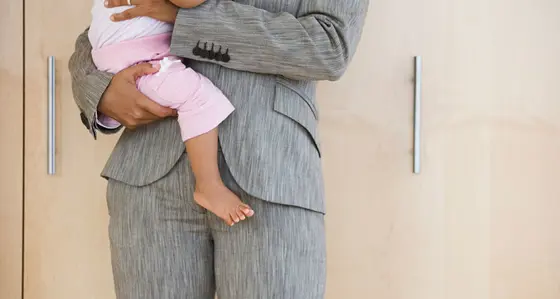
Curating who I wasn’t to fit in
5 min read 12 February 2024
Authenticity is an interesting concept. Do you feel the absence of it if you’re not being fully authentic? Equally, how do you know when you are being authentic?
I’m much more at ease now with who I am so probably more to the left of the code’s sliding scale than where I was as a younger woman.
I always felt I had to assimilate given I was female and from an ethnic minority. First at boarding school, then military school and then Imperial College where I studied engineering. I’d learnt the classic thing of “don’t show emotion or cry in public”. One boss told me not to wear high heels because I’d be taller than him. I accepted it and acted in a way that was more like the men around me; taking more than a passing interest about football and other typically male-dominated subjects - so I’d have things to talk about.
It wasn’t until I had my daughter that my eyes opened to the realities and differences of being a woman vs being a man in society and in particular the workplace.
Care a bit less and be braver
The advice I’d give my daughter is to try and find your superpower and be proud of sharing it and teaching others. I’d also love her to develop the skill of observing, reading context and throwing yourself in, I’ve seen being able to operate in different environment a true marker for people success but also those who seem to love what they do.
I wish I’d known sooner that I could care a bit less and be a bit braver, but that only came with the privilege of age and experience, and no doubt some positional power. In my early career no one spoke about gender. No one asked if I might feel uncomfortable walking into an office full of men. I don’t think my bosses had any level of awareness and how this might impact me. And to be honest I don’t think I really had an appreciation of how this could be impacting how I showed up in the workplace, the additional energy I might have been using to navigate. I’m now a proud wearer of trainers in the workplace when I can get away with it, which feels much at odds with a guy telling me the type, colour and heel size expectations at the start of my working life.
When I reflect on my career, I still don’t believe it’s all been challenging to navigate. A neighbour told me she never shared with colleagues that she had three children. How can you feel so alien in a place that you feel you must hide a fundamental part of yourself? Thankfully I’ve always been happy to bring my daughter into the office to share where mummy works and in part due to her believing we have the best hot chocolate in London.
The language of gender
One thing we are trying to get better at Baringa is to have more conversations around gender and check the language we use.
For example, performance reviews talk about “command of knowledge” and “expertise”. But perhaps they should also include the ability to “empathise” with clients, “collaborate”, “problem-solve” and the ability to “bring people together with warmth”. These female traits make us brilliant consultants and amazing at our team and client interactions, so why do we not explicitly show we value them by writing them down and measuring them as we do with the harder male-dominated traits? How do we ensure the language and skills associated with gender are used equally in how we incentivise and recruit people?
Authenticity vs full self
When I first started at Baringa, things were a bit rough around the edges in terms of conversations on gender. Having the code has made us open up those conversations, however uncomfortable or fumbling they might feel.
I think it’s about allowing yourself to piece together the version of you that you’re comfortable to bring to work, so you can be the best you can. I view authenticity now as choosing what bits of me to save for when I’m at home. I’m pretty sure work wouldn’t want me to be my fully authentic self in the office!
Play it forward: grab the power, then do good
Someone told me recently to “grab the power”. Women are often uncomfortable with power as it’s usually associated with men. But I’ve realised when you have it you can wield it for good.
It’s taken years to feel ok with that. You can play it forward, make changes and adjustments for future generations. I feel very privileged to be able to do that for people in my teams.
More from this series

Supporting different versions of our authentic selves
Parris Lougheed, Executive Assistant, describes her journey as a Black woman discovering the code and finding support throughout Baringa. She believes that rewriting the code must be authentic and allow us to bring our everchanging true selves to work. Parris recently became a parent, and this means discovering a new code, and a new version of her working self.
Read more
Dancing with the code
Sam Bennett, Knowledge Management Advisor, shares exactly what it means to recognise and work within the code. After suffering from imposter syndrome before even starting at Baringa, Sam describes how they were able to become more them at work, how Baringa supported them, and how change now needs to come from the wider industry.
Read more
Wonder Woman doesn’t exist…
Olena Isaieva is happy to admit she is no Wonder Woman. It’s not possible to do everything by yourself, and you shouldn’t try. Our Director in Commodities and Energy Trading in Switzerland credits a strong support system with the success and fulfilment she enjoys, both in her personal life and career. Read on to find out how she is using her own experiences as a woman in male-dominated environments, to support and encourage others at Baringa.
Read more
Freeing the chameleon
From the covert world of law enforcement and intelligence to time in consulting firms big and small, James Hampshire has done his fair share of shape-shifting to fit in. However, following a revelatory diagnosis, James explains how it was time to let go of the mask and reveal his true self.
Read moreRead our Personal Journeys blog

Diversity and inclusion: personal journeys
A series of reflective pieces where brilliant people from within Baringa will share their journeys as individuals or members of our company and community.
Read more


Why I am talking to white people about race
Introducing Jennifer Cook, an expert in organisational and operational transformation and a leader in Baringa’s Ethnic Diversity Network
Read moreIs digital and AI delivering what your business needs?
Digital and AI can solve your toughest challenges and elevate your business performance. But success isn’t always straightforward. Where can you unlock opportunity? And what does it take to set the foundation for lasting success?